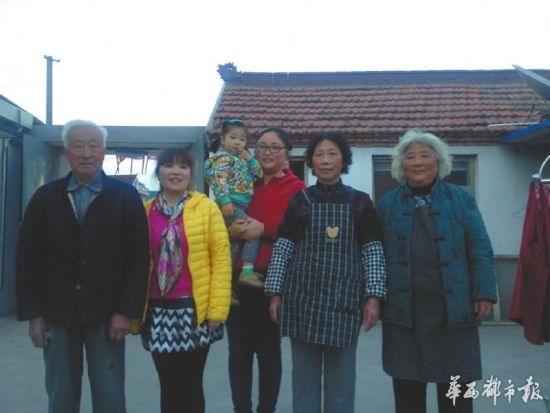Growing old in rural China
china.org.cn / chinagate.cn by Chen Xia, May 14, 2015 Adjust font size:
Twenty-eight-year-old Wang Yinyin lives in with all the generations of his family under one roof, in Yudang Village, Rudong County in east China's Jiangsu Province. Of the 18 family members, 13 are over 50.
The eldest generation is Wang's great-grandmother. The 92-year-old was bed ridden for years. She was looked after by her two daughters. The old sisters were both in their 70s, and were the second generation. Wang's parents are from the third generation. There are eight of them. They are the pillar of the family because their children have just started their careers. In 10 to 20 years, they will become a heavy burden for their children. Wang is from the fourth generation. Born under the "one-child" policy in the 1980s, she had no siblings to help her handle family affairs. Taking into account her husband's family, she will have to look after eight old people in the next few years. Wang's daughter is from the fifth generation of the family. The four-year-old is the apple of her elders' eyes and has no idea of what kind of life lies ahead for her mother.
|
|
| Wang Yinyin (middle) with her family members. [photo / wccdaily.com.cn] |
Rudong County has the largest elderly population in China. At the end of 2014, 29.26 percent of the people living there were over 60. Normally, a society is recognized as an ageing society when 10 percent of its population is over 60.
All over China, the ageing population is expanding, which has caused many problems. The situation is extremely severe in Rudong.
The county previously had no specific government department to provide old-age services. Five public servants in the Social Affairs Department of the Civil Affairs Bureau were responsible for the 280,000 people over 60. But this was not sufficient. When handling the ageing problem, many government departments were involved. For example, the regular physical examination of the old people concerned the Health Care Bureau, the distribution of old-age pension concerned the Human Resources and Social Security Bureau, the building of nursing homes concerned the Urban Planning Bureau, and the allocation of funds concerned the Financial Bureau. To sort out this mess, the county government had to establish a joint meeting mechanism involving 31 government departments.
A "9073" old-age service system was piloted in the county. Under the new system, 90 percent of the old should be looked after by their children, 7 percent by community institutions and 3 percent by nursing homes. However, in reality, nursing homes wouldn't help much. On one hand, they didn't have enough beds to accommodate the 3 percent of the old people, while on the other hand, they were too expensive for normal families, so many beds were unoccupied.
The local government encouraged private investment in old-age services. The local government promised to provide subsidies to any private nursing home meeting government requirements. The highest subsidy could reach 10,000 yuan (US$1,611) per bed. However, private investors remained reluctant to join the cause because it needed a large investment with a rather low return.
Therefore, in Rudong, lives were quite different for the old people.
In a nursing home in Caobu Town, 85-year-old Wu Meiying finally got married to a 73-year-old man. The two were both childless and fell in love in the nursing home. According to the staff, there were four couples formally married in the nursing home, and several couples were in a secret relationship.
In the Binshan Nursing Home, 83-year-old Hong Furu is content with her life. She is carefully looked after and can meet many people of a similar age to her. She only goes back home when she misses her children. For her, the days in the nursing home have been the happiest period of time since her husband passed away.
However, in the suburban area, life is not so enjoyable for 68-year-old Liu. He has to work on a farm and do part-time jobs in the town to earn bread for his wife and parents. Liu's son lives in Shanghai. Liu thinks he can't do anything to help his son, so he tries his best to avoid bothering him. Liu told his son that when he or his wife died, his son could send the other parent to a nursing home. For Liu, it is pointless for a big family to stick to living together.
